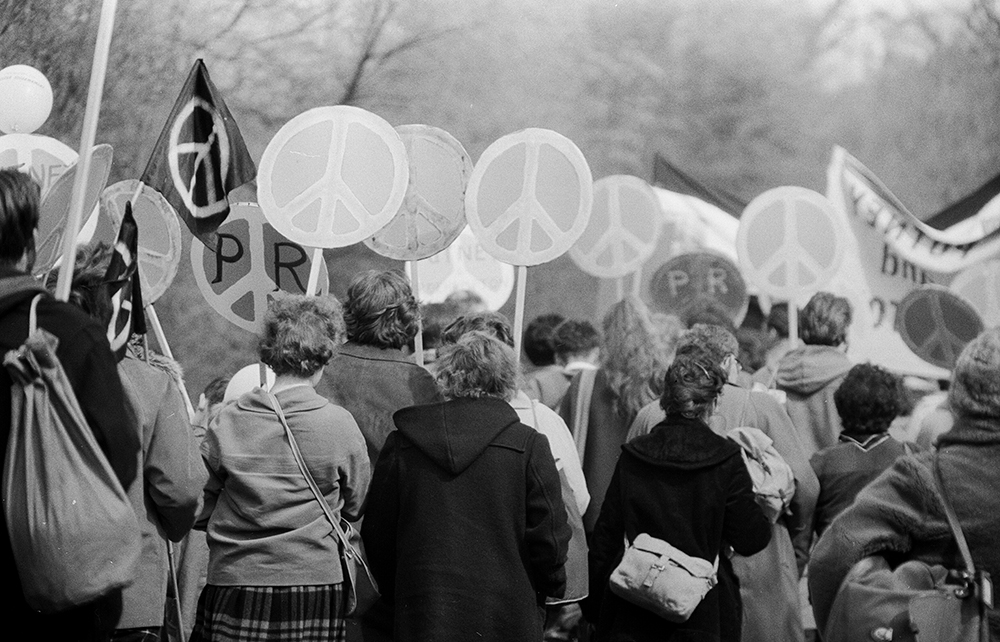A fundamental question is posed midway through this narrative by Michael Portillo. Speaking in his guise as a colourfully dressed TV presenter rather than politician, he demands of Natasha Walter as the cameras roll: ‘What did your parents actually achieve?’ They are standing in a nuclear bunker, the site of her parents’ most audacious stunt, but the implication of futility resounds throughout the book, probed most rigorously by their daughter.
Walter counts as royalty in left-wing activist circles, her parents, Nicolas and Ruth, having been foundational in the nuclear disarmament movement of the 1960s alongside many other progressive campaigns. Nicolas served time in prison and Ruth was arrested. Both repeatedly put their lives on the line for what they believed in – a better, fairer, nuke-free world. It was clearly a given that their daughter would continue to carry the banner. Besides writing The New Feminism (1998), Living Dolls: The Return of Sexism (2008) and a spy novel, A Quiet Life (2016), she has worked tirelessly for refugee women through her journalism, founding a charity in 2007.

Portillo’s probing came at an especially difficult time, four months after the death of Walter’s mother. Nicolas had died in 2000, a firebrand to the end; Ruth had become a quieter, more nervous figure, albeit one who relished fun. Natasha’s final sight of her mother was at Euston station after an enjoyable lunch, only memorable in hindsight in that it was to be their last together. They ate vegetarian Indian food in the newly developed King’s Cross complex and the regeneration of the area prompted talk of progress. They discussed the #MeToo movement and approved of the changing expectations of women over three generations (Walter has a daughter). In retrospect, one statement of her mother’s was ominous but, refusing to pick up the clue, Natasha ‘went on talking about politics, memories and children’. Four days later, Ruth took her own life.
The loss threw Walter into a desperate search for meaning. Ruth’s activist days were well in the past, but how could she have left her family? Why did she choose, in Walter’s terms, ‘the worst possible death… a willed destruction, a deliberate descent into the unknown’? Despite the buoyant suicide note making it clear that Ruth was full of love for them and decidedly compos mentis, Walter can only see her mother’s suicide as an act of defeatism, if not selfishness. The discovery that Ruth’s closest friend knew exactly what she was planning adds to her anguish.
A writer so elegant and measured could never be described as going into a tailspin, but Walter is forced to ponder what her mother’s life amounted to in the face of its grim conclusion. Perhaps the answer lies with a previous generation. Walter travels to Hamburg to seek traces of her maternal grandmother, Eva. As a young Jewish girl dreaming of a musical career, she had fled the Nazis, becoming a put-upon housemaid in Blackheath. A chance meeting in London with her brothers’ friend Georg Oppenheim led to marriage. Her own parents had vanished in the Nazi maelstrom. All the drama was in Eva’s terrifying past; safe in England, with a husband, she wanted only to conform.
Ruth, her daughter, rebelled: ‘Barefoot…braless… undyed, unbrushed hair pulled back into a thick ponytail, her feet tucked up beside her on the sofa.’ Going over her mother’s archive (Ruth was pictured in front-page splashes), Walter begins to replace the timid, unadventurous person she remembers with the activist arrested for civil disobedience aged only 19. ‘I wish I had known that woman,’ Walter writes wistfully.
The crucial incident, and the reason Walter finds herself in a bunker with Portillo, is still so sensitive she refers to the other participants as A, B, C, D, E and F. Calling themselves ‘spies for peace’, they were members of the Committee of 100, a radical group in the disarmament campaign. They gained illicit access to a secret bunker deep in the countryside and discovered it was designed to keep key establishment figures safe in the event of nuclear war. Some participants, terrified by the implications (treason carried the death penalty), left the group. The remainder, including Walter’s parents, vowed to break the story over the Easter weekend of 1963 when a big anti-nuke march was planned. Walter entertainingly explains the sheer bureaucratic difficulty of disseminating information secretly in the pre-internet era. Ruth, with her charm, raised the £100 it would cost them to duplicate 3,000 copies of their leaflet.
In the course of deeply pondering her mother’s legacy, Walter does indeed find meaning, though it’s bitter and hard won. The cause she espouses in the closing pages won’t be to everyone’s taste. Yet renewed activism comes with a sense of futility in this melancholic account. The light may well be fading, she concedes; the challenge is to make your stand all the same.






Comments